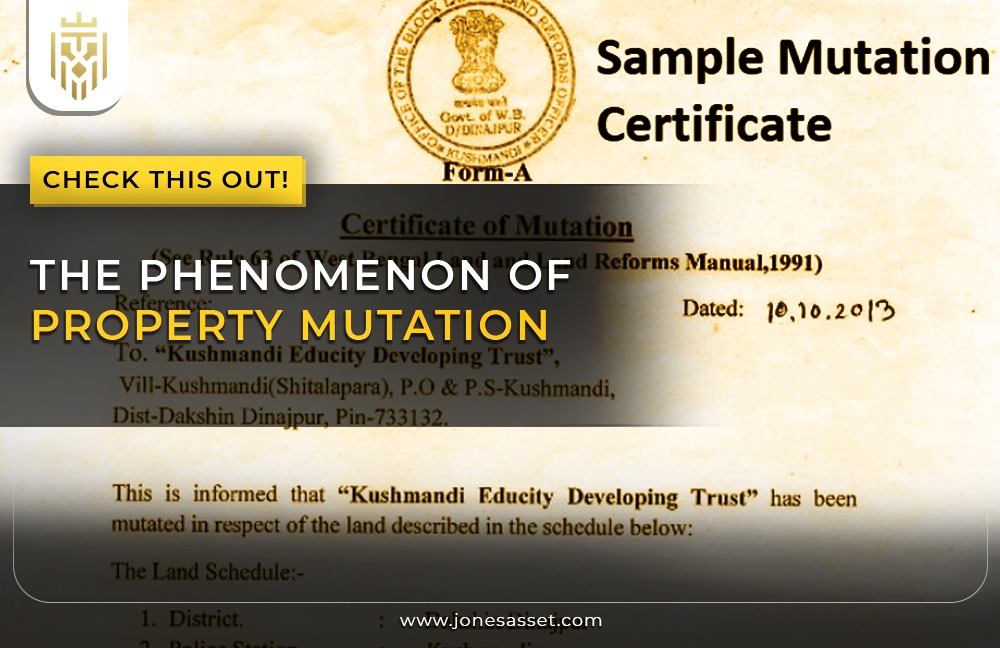What Is a Mutation of Property?
Transferring of the property generally mingled with stress and headache. Perhaps the most important aspect of property ownership entails property mutation. Mutation of the properties is the process of recording changes in property ownership after it has been sold, bought, or inherited. It is a critical step in the legal process of fulfilling a transfer of property rights from one person or entity to another. This mutation takes place in the records kept by the local municipal or revenue authorities and is necessary in order to prevent the wrong person from being recognized as the rightful owner.
Why Property Mutation Is Important
Property mutation is a factor that is essential for real estate operations. It also serves as legal proof to recognize the rights and abilities of the new owner who has full power over the property. The property mutation is key in defining the owner of a property. When there is no mutation certificate, the property ownership remains in doubt and may result in disputes in the future. It is proof of a valid transaction that offers safety to both parties. Moreover, it allows authorities to have an accurate record of the rightful owners to simplify tax collection and development planning.
Benefits of Mutation of Property
1. Legal recognition: By properly mutating the property, the new owner gets legal recognition as the rightful owner of the property and minimizes the chances of conflicts in the future.
2. Tax implications: To ensure compliance with the local tax laws, property mutation is essential. It ensures the tax is levied by the local authorities as payable by the new owner and not the old owner.
3. Transfer of utilities: Essential utility connections such as water and electricity should be transferred to the new owner’s name or it may result in delays.
4. Access to government benefits: For receiving certain benefits from the government like availing home loans or receiving grants, it is important to go through the process of mutating a property.
Why Is Mutation of Property Important for Buyers?
Through property mutation, one will take on the role of a new owner and the issued document will help in dealing with disputes over the ownership. It provides valid proof for an ownership title without any obstructions or unpaid debts. Also, transmitting utilities is only possible through the mutation of property and is essential in accessing any of the basic utilities. This certificate makes it easy for owners to rent, sell, or mortgage the property further in the future. Furthermore, the document helps accumulate the confidence of the buyer towards the authorities responsible for land transactions and allows for compliance with tax laws.
Difference Between Property Mutation and Registration
One of the main differences between property mutation and registration of property is the authorities involved. Where local municipal and revenue authorities are responsible for property mutation, registration of property is taken up by the sub-registrar office. Moreover, mutation of property ensures that the ownership is in the name of the rightful person, whereas, registration of property formalizes the transfer of property through a legal document. In addition, the former ensures legal recognition of the new property owner, while the latter is essential as proof of legal transaction.
Documents to Have for Mutation of Property
To start with the property mutation process some essential documents are needed. Like title deeds/conveyance deeds for verification of transfer of property, NOC from the housing society to confirm payment of all pending dues, identity proofs (Voter Identity, Passport, PAN Card), address proof (utility bill, ration card, passport) and receipts of payment of property tax(if any). The requirement for certain documents might change based on the local guidelines and it is important to consult professionals regarding the same.
What Happens if We Do not Do Property Mutation
Not complying with the property mutation process has consequences for both parties. Here are some serious consequences you might have to face:
1. Lack of legal recognition: By not conforming to the process of property mutation, the new owner might not have legal recognition as the legitimate owner, thus resulting in disputes and challenges in terms of property in the future.
2. Inability to transfer utilities: Failing to mutate a property can cause problems with transferring basic utilities and can cause delays in accessing them.
3. Tax implications: Non-mutation of property can result in heavy penalties, fines, and non-compliance to local tax laws as the new owner will not be assumed as the liable person to pay them.
4. Limited access to government benefits: The government seeks a mutation certificate as proof of ownership to avail of the schemes and benefits. Not having the required certificate will block owners from benefiting from home loans and subsidies.
5. Legal disputes: If you do not wish to deal with all the costly legal battles about property ownership, then it is best to get a mutation certificate. Not having an appropriate certificate can lead to multiple claims and complicate the entire situation.
Process for Getting a Mutation Certificate
Step 1: Procure an application form
As the first step in getting a mutation certificate in offline mode, visit the municipal office to get an application and fill out the essential details with clarity.
Step 2: Assemble the essential documents
Gather the important documents like the sale deed, the latest tax receipt of the property, identity proof, address proof, and NOC from either the builder or the society.
Step 3: Submit the application
After paying the fees for property mutation, submit the application you filled out with the required legal documents to the concerned municipal office.
Step 4: Verification by authorities
The related authorities have to cross-check the records you have submitted before proceeding with the property inspection regards to its authenticity and legality.
Step 5: Approval and acquiring the certificate
If all the provided documents are found to be in order, the authorities will approve your application for property mutation. Further, the changes will be documented officially and the ownership will be transferred to the new owner.
A mutation certificate holds a very significant place in real estate operations. It ensures that both the parties involved in the transaction are free from any disputes regarding the ownership of property. In addition, it also allows valid proof of the transfer of ownership and utilities like electricity and water. Further, by understanding the requirement of property mutation, both sellers and owners will be able to navigate through real estate with ease. To buy a property without the hassles, contact the best real estate company in Bangalore, Jones Asset Management.
FAQs
-
What is a mutation of property?
Mutation of property is the process of legally recording the change in ownership of property once it has been sold or inherited. It acts as a valid and legal proof of the transfer of property ownership.
-
Why is property mutation important?
Property mutation is important to legally recognize the transfer of ownership to a new owner and ensure he has the rights to the property. With a mutation certificate, the tax liability and the basic utilities are transferred to the new owner.
-
What are the benefits of mutation of property?
Mutation of property can ensure that the new owner has every right on the property, and enables the transfer of necessary utilities and tax liability while making sure there are no disputes and legal complications in the future.
-
What documents are required for the mutation of the property?
Documents like NOC, sale deed, identification proof, address proof, and recent property tax receipts are required when requesting for a mutation certificate from the municipal office.









